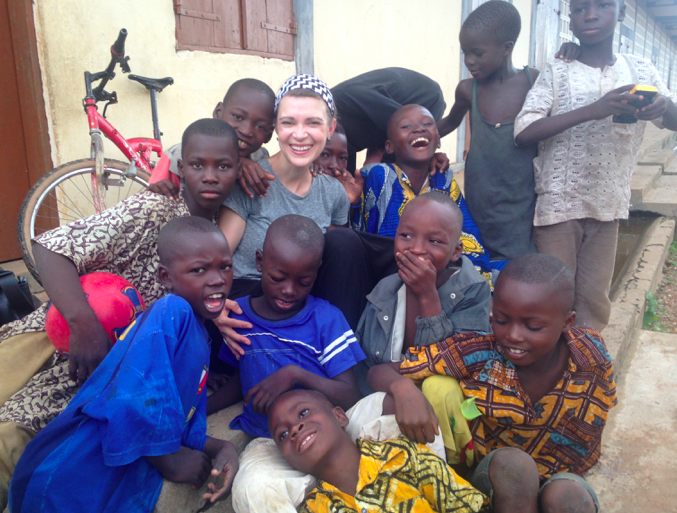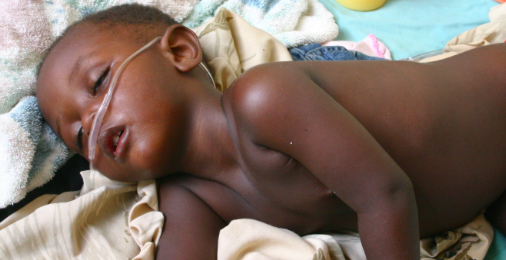while they were sleeping
Whenever I walk through the village of Mango, where the Hospital of Hope is located, little kids stop what they’re doing, point at me, and chant a word that means “white person” in their local language. Well, actually, it literally means, “The Peeled One” because they think white people look like they’ve had their skin peeled off. “BaCHUray! BaCHUray!” the kids yell. Their friends will run over, and then the group of them will chant, “BaCHUray! BaCHUray!” as they giggle.
I stop and wave to them, and they jump up and down as they wave back. Sometimes one or two of them will run up to me and give me a high-five. Then they hold their palm next to my palm to see what happened. Did my whiteness rub off on them? Or did their blackness rub off on me?

When I’m working at the hospital, my pediatric patients never call me “Bachuray,” partly because their parents are very respectful of hospital staff and call me madam, and partly because a lot of our pediatric patients are too sick to speak.
We get a lot of kids who come in with cerebral malaria, where the infection has spread to their brain. These kids are usually seizing and comatose.
Other kids come in with poisonous snakebites or severe malnutrition.
Last weekend I was on call, and there was a torrential rain storm in the afternoon. In the middle of the storm, one of our security guards burst through the door yelling in French, “His intestines are leaving! His intestines are leaving!”
Behind him was a father carrying an 8-year-old boy in his arms. Several dirty towels and shirts were piled onto the boy’s abdomen. As the father laid the boy on a gurney, the security guard told me the boy had been kicked in the stomach by a cow.
And now, his intestines were leaving.
I quickly worked to get the towels off the boy's stomach and then lifted his shirt to see that he had not been kicked, but had been gored by the horn of a steer. It had torn through his stomach and now his intestines were spilling through the tear, piled onto the outside of his stomach.
We called the on-call surgeon, and in a few minutes we had put wet gauze on his intestines and started two large-bore IV’s with fluid. The boy wasn't screaming or crying. He was in shock, just lying there on his back wide-eyed, staring at me. As I was waiting for the nurses to finish the IV's and for the surgeon to arrive, I stood next to the gurney, held one of his hands in mine, and put the other on his forehead. He didn't speak English or French, so there was nothing I could say to comfort him.
As he was studying my face, I gave him a smile, and his face relaxed a little bit. I stood there, holding his hand, returning his gaze, until the surgeon arrived and raced him to the O.R.
The surgery took less than an hour. Thankfully, the steer’s horn had only torn through the stomach wall, not through the intestines themselves. So the surgeon just had to push the intestines back in, and then sew the hole closed.
That night, when the lights were turned low and all the kids in pediatrics were asleep, I walked by their beds, putting my hand on each of their foreheads as I prayed for them to get well, and to grow up to be strong, wise and loving men and women.

As I stood with my hand on the forehead of a 3-year-old boy who was recovering from cerebral malaria, he slowly opened his eyes and looked at me. I smiled at him. He looked at me, studying my face until his heavy eyelids slowly closed again.
Two days later, the boy whose intestines had left was discharged from the hospital. As I saw him walk out the front door with his parents, I wondered if Togolese parents are like American parents, reminding children of the medical adventures they've had during their childhood.
“Remember that time you threw up on grandma’s shoes at Uncle Tim’s wedding? Remember the time you crashed your bike into a parked car and broke your arm? Remember when you had to get stitches in your chin when you were four?”
I wonder if Togolese kids will hear stories as they get older. “Remember that time you were having a seizure and we took you to the Hospital of Hope? Remember when you got gored by a steer in the middle of the rainstorm and your dad picked you up and sprinted to the hospital with you in his arms?”
Or maybe these kids will remember all on their own the times they were sick and came here. The times they needed to take medicine, and then felt better. The night they were lying in their hospital bed with a high fever, when they opened their eyes to find a Bachuray woman with her hand on their forehead, smiling, praying over them while they were sleeping.